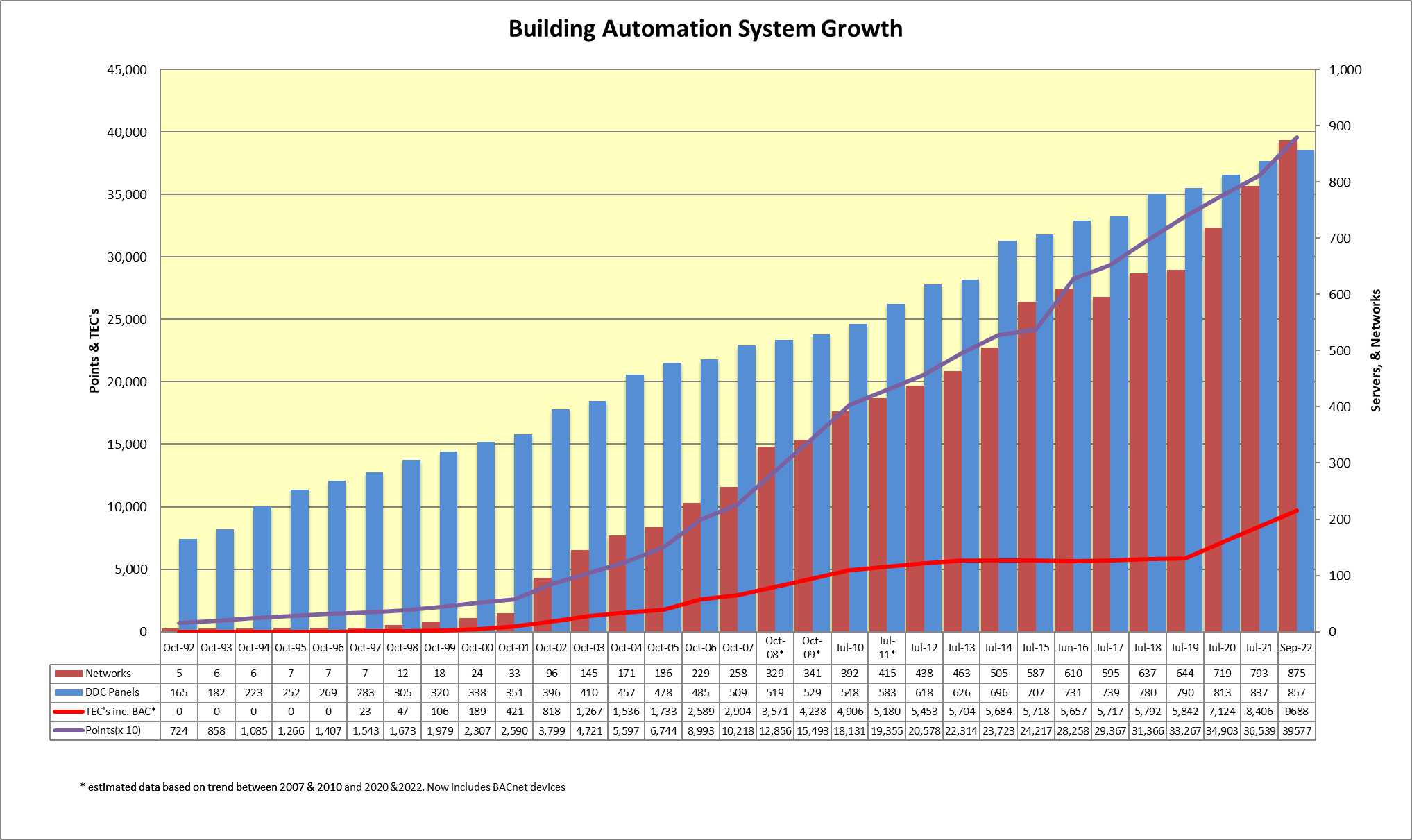Building Automation Systems (BAS) is part of the University of Michigan’s Maintenance Services department. BAS serves nearly all of the University’s General Fund Buildings, and a few non-general fund buildings. BAS implements schedule and operational changes for various types of equipment and monitors alarm conditions and energy efficient system operation.
Direct Digital Control
Direct Digital Control, known as “DDC” is at the heart of building automation. DDC measures environmental conditions and compares the measurements to the desired settings (a.k.a. setpoints). It calculates an appropriate response if the two aren’t equal, and sends out control signals to correct for any difference. Start/stop control and alarm reporting are also incorporated into DDC.
Controlled Equipment at the University of Michigan
At the University of Michigan, DDC is typically used to control fan systems, namely the supply and return fan speeds, fresh-air mixing dampers, heating and cooling coils and humidification systems, all to maintain the desired fan discharge temperature and humidity and ultimately the occupied spaces of buildings. Additionally, BAS may control and/or monitor fume hood exhaust fan and energy recovery controls, using the available heating/cooling from the exhaust air to heat/cool the outside air that’s being drawn into the building by the supply fans. CO2 monitoring also provides for controls that adjust fresh air to auditoriums as the occupancy level changes. BAS also controls complex chilled water systems, including primary/secondary/tertiary chilled water loops, cooling towers start/stop and where available variable-speed controls, free-cooling systems, as well as outside and inside lights, hot water pumps and a rapidly growing number of individual DDC room controls.
Prior to DDC
Regardless of whether you have DDC in your rooms, the local thermostat should be able to adjust individual room/zone temperatures. If all of the areas served by a particular fan system are too hot or cold, the fan system’s DDC may need attention. However, if there is a problem in one specific area while other areas served by that same fan system are fine, it usually means the local controls are at fault.
Occupancy Schedules
The building occupants determine the schedules. Typically each building has a representative who collects schedule information before passing it along to BAS. Schedule changes can be sent to Building Automation Systems, 326 E. Hoover, Campus zip 1002 or via email fo-bldgautosys@umich.edu.
BAS Operation
We have several computer consoles connected to our campus-wide networks, from which Utility Systems Technicians and Control System Specialists can make program changes that alter schedules and modify control operation. Changes are sent to remote panel-mounted computer servers which control the building systems. The servers perform stand-alone control for autonomous operation whenever networks are unavailable.
Building Automation System Growth Chart
HVAC Controls
The HVAC Controls/Building Automation Systems group is responsible for installing and maintaining all direct digital control equipment.
Installation of new DDC equipment involves:
- Calculate and write up information for DDC points then field staff install the database into the host system from a work terminal
- Write program lines to fit the engineered “sequence of operation”
- Terminate pneumatic tubing and electrical wiring
- Install raceways for all pneumatic tubing
- Install raceways for electrical and electronic wiring
- Install field input devices: temperature, humidity, co2, air flow, and water flow sensors
- Install field output devices: electric to pneumatic transducers, analog to voltage transducers, analog to current transducers, valve and damper actuators
- Start-up and test systems in the field and make necessary changes to fine-tune system operation
The group also installs direct digital control equipment and reviews blueprints and control diagrams to be sure that the information is correct as to how it relates to a proper “sequence of operation” for system control. Sensor ranges are also reviewed to be sure they will perform properly according to the systems requirements.
Maintenance of DDC equipment includes calibrating and testing input sensors (temperature, humidity, CO2, air flow, and water flow), analog output devices (electric to pneumatic transducers, analog to voltage transducers, analog to current transducers), and current sensing relays. The group diagnoses and replaces defective components within the direct digital control field panels, such as controller modules, power supplies, and various input?output modules. Database analysis is also performed to identify program errors and allow for corrective actions. System control loops are tuned as needed, and older DDC systems are evaluated and receive upgraded hardware and/or software as needed for better control and energy savings.
Energy Conservation Outreach
Energy Conservation Outreach (ECO) is a program to help building owners and managers make profitable investments in energy-efficient equipment and operations. Energy Conservation Outreach includes the following activities for the Green Lights Program:
- Building tune-up
- Load reductions
- HVAC Distribution Systems Upgrades
- HVAC plant Upgrades
The Air Conditioning/controls group’s primary responsibility is Stage Two-Building tune-up. A complete tune-up of the building HVAC systems includes operational testing of the following pneumatic, DDC, electric, and electronic controls, which include dampers, humidifiers, heating and cooling valves, heating and cooling coils, heat exchangers, supply fans, return fans, exhaust fans, and room controls.
Building Automation Systems Contact List
| Name | Title | Phone | |
|---|---|---|---|
| Open | Building Automation Systems Manager | 734.647.0962 | |
| Open | Application Programming Supervisor | 734.647.3348 | |
| Open | Direct Digital Controls (DDC) Supervisor | 734.936.3259 | |
| Katherine Cramer | Administrative Assistant | kcramer@umich.edu | 734.936.3955 |

